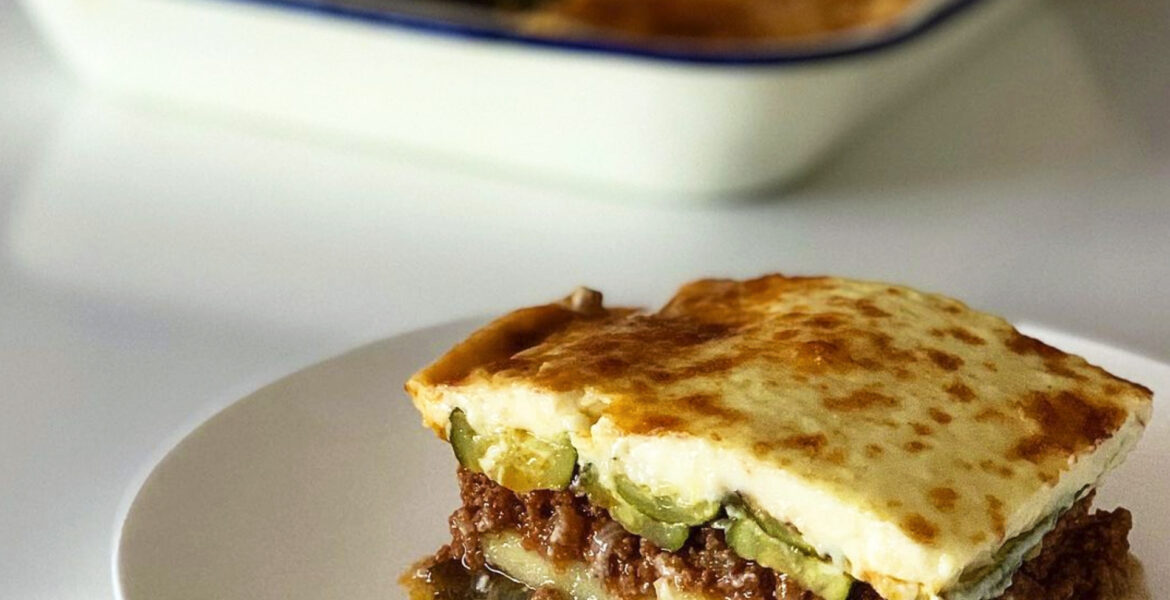div id='buzzsprout-large-player-artist-the-ouzo-talk-podcast'>
“It started as a Turkish dish,” says Conistis. “It was definitely a braised eggplant and lamb dish that was brought over during the Turkish occupation, but it only became what it became now when one of the main, key cookbooks – Tselementes came out. “When (Nikolaos) Tselementes brought out his cookbook, he tried to take back what he believed was Greek cuisine that was lost and remove what he believed were the ‘dirty’ flavours – cumin and so on. “He adjusted the dish and made it less spicy, but because he’d been trained in Switzerland and France and so on, he started incorporating a lot of French dishes and sauces into it. He basically took this dish (moussaka), simplified the ingredients and then covered it in bechamel and created what is known as a ‘Moussaka’. Joined on the podcast by renowned Greek chef David Tsirekas, as well as Mary Politis from popular website ‘Mary’s Kouzina’, the trio were in all in agreement as to the origins of what many consider the ‘national dish’ of Greece. “In history it starts off as a Turkish dish, but it’s definitely Greek – with a lot of thanks to the French for the bechamel,” concluded Conistis On the origins of other well-known dishes meanwhile, Tsirekas was emphatic when it comes to the much-loved ‘Baklava’. “We have this argument about Baklava – it’s not Greek,” says Tsirekas. “We use ingredients that are indigenous to Greece, whereas you go further East, it becomes more Pistachio-based, or pine-nut-based. “Then we’ve got things like ‘Dolmades’. I’m sorry guys, it’s not Greek. My mother doesn’t call them Dolmades, she calls them ‘Sarmades’ – ‘sarma’ means ‘wrap’ in Ottoman.” Conistis adding that “the Cretans call them ‘Yiaprakia’.” “This is a huge chunk of history to shape our cuisine,” reminds Tsirekas. “We can’t deny it, we can’t be resentful of it. It’s made us rich because it also includes the Ventians, the Frankish. “The true Greek, Hellenic cuisine is based in ancient times. If we go to what Tselementes did – they call it the Tselementes effect – he wanted to de-Ottomanise where Greek food was because it played such a huge part in where we are today.” The Ouzo Talk podcast is available on all major podcast streaming apps, including Apple Podcasts, Spotify, Google Podcasts, SOUNDIS.GR and more. Subscribe so you never miss an episode. Listen also to Ouzo Talk episode Mary Coustas: ‘Greek women are super powerful’Is Moussaka Greek? Chefs have their say

Ask any non-Greek to name a Greek dish, and Moussaka will inevitably be in the top three responses given. But is it even a Greek dish? Three passionate Greek-Australian chefs and cooking experts have now had their say.
Speaking on the latest episode of the Ouzo Talk Podcast, Head Chef of Alpha and Ploos restaurants in Sydney, Peter Conistis, points to a complicated evolution of the dish we all know as Moussaka.

